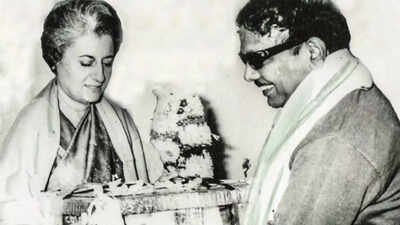In 1969, Karunanidhi set up a committee to look into Centre-state relations, but the report was ignored. Fiifty years on, after run-ins with Union govt, Stalin forms a panel to do the same, but it too may bring little change.The state autonomy resolution by the
Tamil Nadu legislature and the consequential walk-out by BJP and AIADMK has reopened the debate on India’s federal structure.
The constitution of the Justice Kurian Joseph panel to review Centre-state relations, with an interim report by Jan 2026, has drawn mixed reactions. What gave impetus to the resolution was the state’s stunning Supreme Court victory which fixed a time limit for the governor to grant assent to a bill passed by the legislature.
The court also exercised its extraordinary power under Article 142 of the Constitution and granted assent to 10 pending bills.
The slogan “more powers for the state” has reverberated in political circles for the past five decades. When
DMK assumed office in 1967 defeating the
Congress for the first time, it began to feel the dominance of the Union govt. It wasn’t just TN that faced this. In 1967, the Congress lost in eight states. But with little fiscal autonomy, states were reduced to glorified municipalities, dependent on the finance commission to dole out funds.
The question of fiscal autonomy was raised by Kerala, which appointed the Professor K N Raj Committee to study it.
In 1969, M Karunanidhi appointed Justice P V
Rajamannar (former Chief Justice of the Madras high court) to head a three-member committee on state autonomy and Centre-state relations.
The report recommended reforms to strengthen Centre-state relations and the federal structure that included ending the governor’s power to dismiss the state council of ministers, curbing the President’s authority to impose President’s Rule under Articles 357 and 365 and transferring residuary legislative powers to the state list.
While the Rajamannar committee report received much attention, being the first to deal with Centre-state relations, it was largely ignored by the Congress and Vajpayee govts. Vajpayee later set up a Constitution Review Committee under former Chief Justice of India Venkatachalaiah, which upheld the existing process for appointing governors but suggested the President consult the chief minister before doing so.
The Rajamannar report came in 1971. By then, the DMK entered into an alliance with the Congress headed by Indira Gandhi. The slogan was “Welcome Nehru’s daughter, give us stable rule.” Strategically, DMK gave her 25 of 40 parliamentary seats but none in the state assembly — marking the Congress’s decline in TN.
Ties soured quickly after that. Karunanidhi’s govt was dismissed in Feb 1976, and many DMK leaders, including his son M K Stalin, were jailed under the Maintenance of Internal Security Act for more than a year. After the dismissal of Kerala’s EMS Namboodiripad govt in 1959, DMK became the biggest victim of Article 356, facing dismissal multiple times. Thus, talk of the future of state govts in the federal structure and the misuse of Article 356 began to be debated.
After MGR split DMK to form the AIADMK, Karunanidhi faced more trouble. The Centre appointed the Justice Sarkaria Commission to probe his govt, and a criminal case was filed under the Prevention of Corruption Act. Karunanidhi’s plea challenging the Act’s applicability to public servants was rejected by the Supreme Court in 1979. His party’s general secretary and leader of the opposition K Anbazhagan and nine other MLAs were expelled from the legislative assembly for burning Part XVII of the Constitution providing Hindi as the official language.
The challenge to the action was rejected by the high court in 1987. His attempt to make Tamil compulsory in primary schools was also struck down by Madras HC. Karunanidhi’s 18-year tenure as CM, across three terms, was mostly spent battling MGR and Jayalalithaa. Stalin has faced greater challenges. Since assuming office in 2021, he has had to face a strong Centre headed by a powerful BJP. Most issues that had cropped up during his father’s time continue to haunt him.Besides, he has taken up other all-India issues such as the Citizenship Amendment Act and Waqf Amendment Bill.
During Stalin’s tenure, many ministers faced Enforcement Directorate action, arrests and jail time. The appointment of R N Ravi as governor has intensified tensions between Raj Bhavan and the secretariat. It saw for the first time the governor refusing to read the full budget speech and walk out of the House during the session. As ex-officio chancellor, he also delayed giving assent to bills and blocked vicechancellor appointments.Following in the footsteps of Punjab governor Banwarilal Purohit, Telangana governor
Tamizhisai Soundararajan and Kerala governor Arif Mohammed Khan, he also refused to give his assent. While Purohit relented after a SC notice, Ravi held firm and the court had to advise him of his constitutional role, ultimately leading to the Supreme Court granting assent to bills for the first time in the history of the Constitution.
Monsoon relief funds were delayed and fell short of demand. The employment guarantee scheme funds delay virtually choked it. In response to Centre’s National Education Policy (NEP), Stalin set up the Justice
Murugesan panel to evolve a state’s policy on education. Realising the illegal transfer of “education” from the state to concurrent list was resulting in greater concentration of power with the Centre Stalin was the first to sound the cry for the retransfer of the subject to the state list.
The legislative assembly passed resolutions opposing the Citizenship Amendment, Waqf Bill and the One Nation One Election proposal. After failing to secure NEET exemption, his govt passed a state law on it, which is now facing a legal battle. A similar fate met the online rummy ban, where he had to face the court, and the Centre’s unwillingness. Rejection of NEP led to a denial of Sarva Shiksha Abhiyan funds.
Thus, more than his father, the present CM is facing an all-round battle. While his father can be compared to Arjuna in the battlefield, Stalin is like Abimanyu. Setting up a panel to study Centre-state relations is a clear sign of the troubles and unfair treatment the state govt is going through.
At most, the report can be used as ammunition in the demand for state autonomy and may be made an issue in the coming elections.
(The writer is a former judge of Madras high court)










